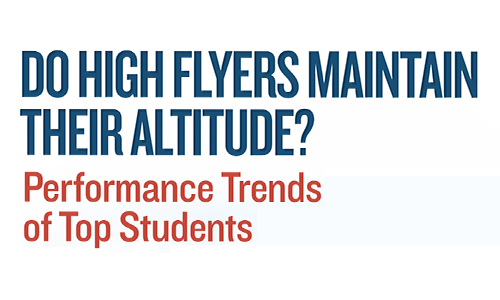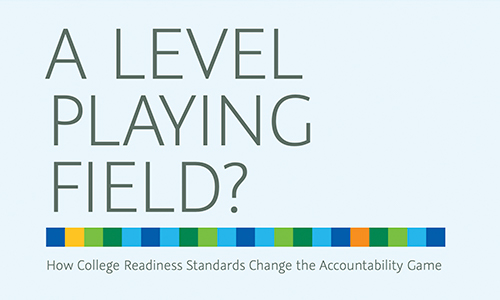Media mention
Testing anxiety, boredom & guesses: What expert Steven Wise has learned about exams and ‘rapid-guessing behavior’ — and what that tells him about your child’s score
2019
The 74

Description
Steven Wise shares some of his most recent findings on test engagement in this interview.
Go to articleTopics: Equity, School & test engagement
Associated Research

Blog article
Related Topics


Do high flyers maintain their altitude?
In the visualizations in this exhibit, you can compare the performance and growth of various groups of high achievers to that of their peers over multiple years.
By: Yun Xiang, Michael Dahlin, John Cronin, Robert Theaker, Sarah Durant
Topics: Equity, High-growth schools & practices


A level playing field: College readiness standards
Some of our assumptions about the growth and performance of students from high-poverty schools relative to their peers from wealthier schools may be challenged in this data gallery, where you can explore how school poverty level interacts with student growth, college readiness, and college access.
By: Michael Dahlin, Beth Tarasawa
Topics: Equity, College & career readiness


An investigation of examinee test-taking effort on a large-scale assessment
Most previous research involving the study of response times has been conducted using locally developed instruments. The purpose of the current study was to examine the amount of rapid-guessing behavior within a commercially available, low-stakes instrument.
By: Steven Wise, J. Carl Setzer, Jill R. van den Heuvel, Guangming Ling
Topics: Measurement & scaling, School & test engagement, Student growth & accountability policies


A level playing field: College readiness standards
This study examines the academic growth of 35,000 elementary and middle school students in 31 states—all of them high achievers within their own schools—over a three-year period.
By: Michael Dahlin, Beth Tarasawa
Topics: Equity, College & career readiness


Do high flyers maintain their altitude? Performance trends of top students
In this study from the Thomas B. Fordham Institute, achievement trends from NWEA’s longitudinal growth database were used to track students who scored at or above the 90th percentile on this assessment in order to see if they maintained their high achievement.
By: Yun Xiang, Michael Dahlin, John Cronin, Robert Theaker, Sarah Durant
Topics: Equity, High-growth schools & practices


The utility of adaptive testing in addressing the problem of unmotivated examinees
This integrative review examines the motivational benefits of computerized adaptive tests (CATs), and demonstrates that they can have important advantages over conventional tests in both identifying instances when examinees are exhibiting low effort, and effectively addressing the validity threat posed by unmotivated examinees.
By: Steven Wise
Topics: Measurement & scaling, Innovations in reporting & assessment, School & test engagement


Effort analysis: Individual score validation of achievement test data
Whenever the purpose of measurement is to inform an inference about a student’s achievement level, it is important that we be able to trust that the student’s test score accurately reflects what that student knows and can do. Such trust requires the assumption that a student’s test event is not unduly influenced by construct-irrelevant factors that could distort his score. This article examines one such factor—test-taking motivation—that tends to induce a person-specific, systematic negative bias on test scores.
By: Steven Wise
Topics: Measurement & scaling, Innovations in reporting & assessment, School & test engagement




